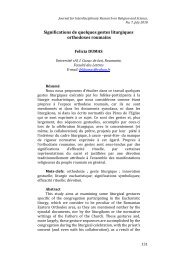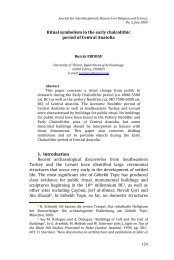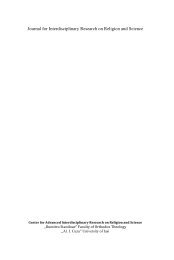Religious Dualism: Some Logical and Philosophical Difficulties
Religious Dualism: Some Logical and Philosophical Difficulties
Religious Dualism: Some Logical and Philosophical Difficulties
You also want an ePaper? Increase the reach of your titles
YUMPU automatically turns print PDFs into web optimized ePapers that Google loves.
AFLOROAEI - <strong>Religious</strong> <strong>Dualism</strong>: <strong>Some</strong> <strong>Logical</strong> <strong>and</strong> <strong>Philosophical</strong> <strong>Difficulties</strong><br />
reject but complete each other” 42 . As a rule, dualism becomes<br />
obvious in the anthropomorphic visions, in which the cosmos<br />
<strong>and</strong> its creation is explained by means of categories defining<br />
human behaviour. “From an anthropomorphic perspective, the world<br />
seems to have been created like any man-made thing. The dualism<br />
characterising the demiourgos’ work is exp<strong>and</strong>ed to the whole universe.<br />
But there is something more about it, the difficulty of expressing the<br />
bivalence of the principle in an intelligible way. Philosophers have faced<br />
this difficulty for a long time, being hardly able to overcome it” 43 .<br />
However, the dualism of certain cosmogonic legends is, in<br />
some cases, questionable. For example, it is hard to sustain the<br />
idea that “the devil is co-eternal with God”, <strong>and</strong>, consequently,<br />
“it does not depend on Him ontologically” 44 . Such a nondependence<br />
would place the devil in a world completely<br />
separate from that created by God. Let us remember that, for<br />
the Christian fathers, eternity does not always appear as a<br />
determination of God. From an apophatic perspective, God is<br />
neither eternal nor non-eternal, he is beyond these criteria, the<br />
Creator of both eternal <strong>and</strong> temporal things. Vladimir Lossky<br />
revives an older idea, stating that, from the point of view of<br />
apophatic theology, eternity itself was created by God 45 . In fact,<br />
even if we underst<strong>and</strong> eternity as an unlimited period, aion, it<br />
still represents a determination. Or a determination is a<br />
manifestation of the divine creative power. In other words,<br />
eternity originates in the divine act of creation, it represents a<br />
manifestation of the divine creative power. Lossky restates an<br />
observation made by Saint Maxim the Confessor, that eternity<br />
defined in opposition with time is still a determined eternity. It<br />
42 Ibidem, pp. 103-104.<br />
43 Ibidem, p.104. The idea is developed with further details. „All these<br />
aspects characterise the same anthropomorphic vision which function in<br />
strict spatial coordinates: a particular place of the genesis is located in the<br />
vicinity, a certain real or imaginary character looks like the local people, etc.<br />
The cosmos is modelled twice: firstly, it behaves like people in general,<br />
secondly, like the people living in a determined time <strong>and</strong> space” (ibidem, p.<br />
118). 44 Ibidem, p. 112, with reference to a cosmogonic legend mentioned by<br />
Tudor Pamfile in The Tale of the Old World based on Romanian Folk Beliefs,<br />
edited <strong>and</strong> prefaced by Antoaneta Olteanu, Paideia Publishing House, p. 8.<br />
45 Cf. Vladimir Lossky, Écrites théologiques (the study Création: temps<br />
et éternité), Edition du Cerf, in the collection La vie spirituelle, nr. 677, tome<br />
141, 1987, pp. 562-581.<br />
100





